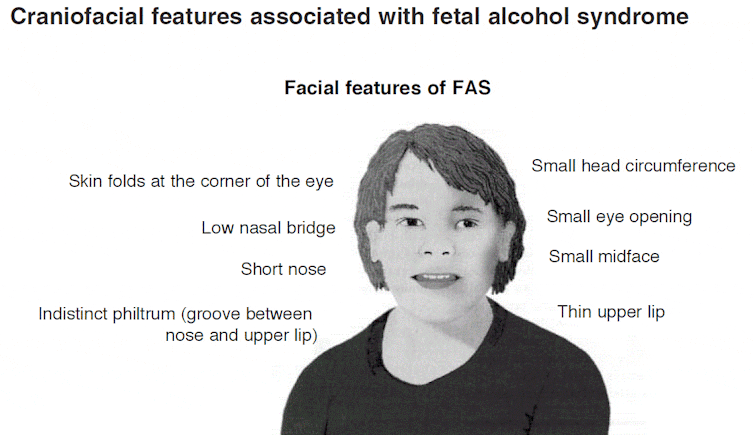
Cheryl McQuire, University of Bristol
The UK has the fourth highest prevalence of drinking in pregnancy in the world. This puts a significant number of people at risk of a group of conditions known as foetal alcohol spectrum disorder (FASD). Until now, though, the prevalence of FASD in the UK has not been known.
For our study, we followed the development of 13,495 children born in the west of England in the early 1990s. Using a wide range of information on their development and their mothers’ reported drinking in pregnancy, we developed a screening tool and found that up to 17% of children had features consistent with FASD.
This means that these children had evidence of being exposed to alcohol in pregnancy and had problems with at least three different areas of learning and behaviour. Some children also had physical features of FASD, including below average growth and distinctive facial features (small eyes, smooth philtrum and a thin top lip). Most, however, did not show these physical signs. This suggests that FASD could be a relatively hidden disability.

Drinking in pregnancy was common in the early 1990s. Up to 79% of mothers reported drinking alcohol in pregnancy, and a quarter of mothers reported binge drinking.
Information on drinking in pregnancy was collected in the early 1990s and guidance has since changed to recommend abstinence throughout pregnancy. But rates of prenatal alcohol exposure in the UK have remained high. Recent estimates suggest that three-quarters of women drink during pregnancy, with one third at binge levels. This suggests that FASD is a problem that could affect many people in the UK today.
Consistent with our findings, international studies suggest that FASD is the leading cause of developmental disability worldwide. Studies from the US, Canada, Italy, Poland and Croatia estimate that 1-10% of school children are affected. In South Africa, up to 28% of children could be affected.
Overlooked health problem
It is important to point out that the results of our study are based on a screening tool, which is not the same as a formal diagnosis. Our results should be considered a starting point for understanding the potential scale of the problem in the UK, and more research on this poorly understood and complicated condition is needed. Still, the high rates of drinking in pregnancy and symptoms relevant to FASD that we found in our study suggest that FASD may be a significant and previously overlooked public health problem in the UK.
FASD is associated with over 400 physical and mental health conditions. The societal and economic costs associated with FASD are considerable, estimated to be CAN$1.8 billion per year in Canada, and people with FASD are at
risk of other problems in later life, including alcohol and drug problems and trouble with the law. Diagnosis and support can help reduce the risk of these problems in later life.
Our study is an important starting point because without UK estimates of FASD prevalence, awareness will remain low and those affected by this lifelong condition will continue to find it difficult to seek a diagnosis and access the support to help them achieve the best possible outcomes.
There are limited resources for FASD diagnosis and support in the UK, with only one specialist clinic in England. The All Party Parliamentary Group on FASD and the British Medical Association concluded that research was urgently needed because until the true scale of the prevalence of FASD is understood, government and service commissioners will continue to have difficulty responding to the issue, including planning and providing appropriate levels of service. Our findings offer a starting point for addressing this research gap.![]()
Cheryl McQuire, Research Associate in Epidemiology and Alcohol-Related Outcomes, University of Bristol
This article is republished from The Conversation under a Creative Commons license. Read the original article.
